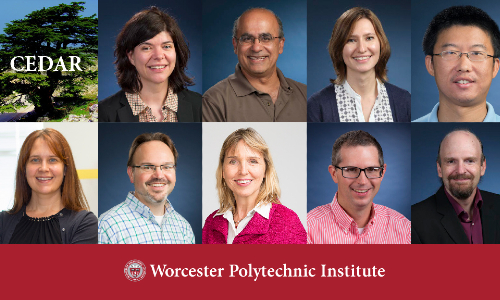National Science Foundation Research Traineeship Programs
WPI is proud to be the recipient of not one, but two National Science Foundation Research Traineeship programs. The programs provide exceptionally talented graduate students with specialized training and funding assistance to join careers at the forefront of technology and innovation. NSF funds programs that explore ways for graduate students in research-based master’s and doctoral degree programs to develop the skills, knowledge, and competencies needed to pursue a range of STEM careers.
Currently, the NRT program hosted at WPI is focused on the circular economy.
CEDAR: Data-Driven Engineering
WPI's circular economy traineeship, known as CEDAR (Circular Economy and Data Analytics Engineering Research for Sustainability), will pioneer a new NSF traineeship model whereby NRT trainees join a community of scholars with expertise and interests that span chemical sciences, social sciences, and communication, with convergent focus on advancement of the circular economy. Eligible graduate students are invited to apply to become CEDAR trainees to participate in this interdisciplinary CEDAR traineeship program at WPI.

WPI Wins $3 Million Award to Launch Graduate Program Preparing Data-Driven Leaders To Build a More Sustainable and Just Future
Seeking to move beyond current economic models that emphasize the use of nonrenewable materials and the generation of waste streams that disproportionately affect more vulnerable communities, Worcester Polytechnic Institute (WPI) is launching a pioneering graduate program that brings together data sciences, chemical sciences (chemistry, biology, physics), and engineering to prepare leaders who can build and sustain circular economies that maximize the use of renewable materials, increase the efficiency of manufacturing, turn waste into new products, and minimize irreducible waste streams.

WPI Researchers Win $3M Award to Study Human-Robot Interaction in the Workplace
Anticipating a future of work that establishes a division of labor between humans and robotic technology, Worcester Polytechnic Institute (WPI) researchers have secured a five-year, $3 million National Science Foundation grant focusing on research and training related to the adoption of robotic assistants in the workplace. WPI received the grant from NSF’s Research Traineeship (NRT) program, which awarded $49 million to 17 institutions across the United States to develop and implement graduate education traineeship models in science, technology, engineering, and mathematics (STEM) fields.